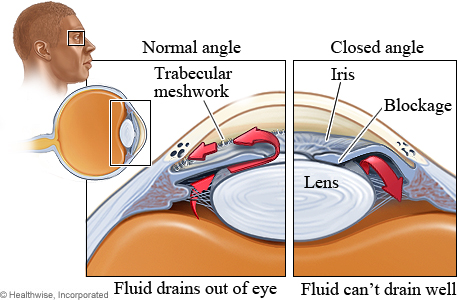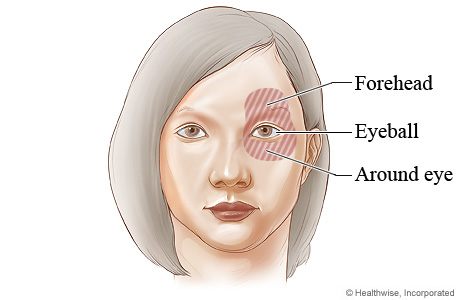Closed-Angle Glaucoma

In closed-angle glaucoma, the colored part of the eye (iris) and the lens block the movement of fluid between the chambers of the eye. The blockage of fluid causes pressure to build up and makes the iris press on the eye's drainage system (trabecular meshwork). The increased pressure can cause damage to the optic nerve, leading to vision loss and possible blindness. Closed-angle glaucoma is also sometimes referred to as primary angle-closure glaucoma (PACG).
Closed-Angle Glaucoma: Areas of Pain

Pain from closed-angle glaucoma may occur in the eye itself or in the area immediately surrounding the eye, including the forehead.
How is closed-angle glaucoma treated?
Treatment usually includes a type of laser surgery. This may be needed right away. Eyedrops and other medicines may be used to lower the pressure in the eye until surgery can be done. Your doctor may check your other eye and treat it before it becomes affected.
How can you care for yourself when you have acute closed-angle glaucoma?
- Take your medicines exactly as prescribed. Call your doctor if you think you are having a problem with your medicine. You will get more details on the specific medicines your doctor prescribes.
- Use eyedrops exactly as directed by your doctor.
- Ask your doctor if you can take an over-the-counter pain medicine if needed, such as acetaminophen (Tylenol), ibuprofen (Advil, Motrin), or naproxen (Aleve). Read and follow all instructions on the label.
Acute closed-angle glaucoma: When to call
Call your doctor now or seek immediate medical care if:
- You have new or worse eye pain.
- You have vision changes.
Watch closely for changes in your health, and be sure to contact your doctor if:
- You are not getting better as expected.
©2011-2026 Healthwise, Incorporated
